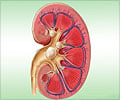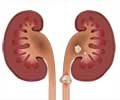
‘Genetic factors associated with metabolic and crystallization pathways may increase the risk of urolithiasis. Changing lifestyle factors like hydration, weight control, and food intake may be useful for disease prevention.’
Read More..Tweet it Now
HighlightsRead More..
- A large genome-wide association study has identified 14 variants including nine new variants at different locations in the genome that are linked to the development of kidney stones.
- Four of the variants were related to obesity, high triglycerides, or high blood uric acid levels. The remaining ten variants were associated with kidney- or electrolyte-related traits that might affect crystallization pathways that lead to kidney stone formation.
To provide new insights into the condition and its potential genetic causes, a team led by Koichi Matsuda, MD, PhD and Chizu Tanikawa, PhD (The University of Tokyo) performed a large-scale analysis of the entire genomes of 11,130 Japanese patients with urolithiasis and 187,639 controls, followed by a replication analysis of 2,289 affected patients and 3,817 controls.
The analysis revealed 14 variants at different locations in the genome that were linked to urolithiasis, including nine new variants. Four of the variants were related to obesity, high triglycerides, or high blood uric acid levels. The remaining ten variants were associated with kidney- or electrolyte-related traits that might affect crystallization pathways that lead to kidney stone formation.
"To the best of our knowledge, this study included the largest number of urolithiasis cases," Dr. Matsuda. "Because urolithiasis is a preventable disease by changing lifestyle factors such as hydration, weight control, and food intake the study's results are useful for risk prediction and disease prevention," said Dr. Matsuda.
Advertisement















